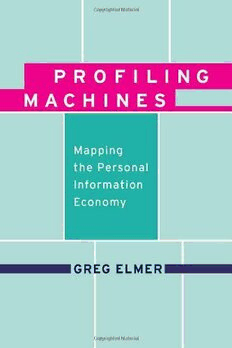Download Profiling Machines: Mapping the Personal Information Economy PDF Free - Full Version
Download Profiling Machines: Mapping the Personal Information Economy by Greg Elmer in PDF format completely FREE. No registration required, no payment needed. Get instant access to this valuable resource on PDFdrive.to!
About Profiling Machines: Mapping the Personal Information Economy
In this book Greg Elmer brings the perspectives of cultural and media studies to the subject of consumer profiling and feedback technology in the digital economy. He examines the multiplicity of processes that monitor consumers and automatically collect, store, and cross-reference personal information. When we buy a book at Amazon.com or a kayak from L.L. Bean, our transactions are recorded, stored, and deployed to forecast our future behavior--thus we may receive solicitations to buy another book by the same author or the latest in kayaking gear. Elmer charts this process, explaining the technologies that make it possible and examining the social and political implications.Elmer begins by establishing a theoretical framework for his discussion, proposing a "diagrammatic approach" that draws on but questions Foucault's theory of surveillance. In the second part of the book, he presents the historical background of the technology of consumer profiling, including such pre-electronic tools as the census and the warranty card, and describes the software and technology in use today for demographic mapping. In the third part, he looks at two case studies--a marketing event sponsored by Molson that was held in the Canadian Arctic (contrasting the attendees and the indigenous inhabitants) and the use of "cookies" to collect personal information on the World Wide Web, which (along with other similar technologies) automate the process of information collection and cross-referencing. Elmer concludes by considering the politics of profiling, arguing that we must begin to question our everyday electronic routines.
Detailed Information
| Author: | Greg Elmer |
|---|---|
| Publication Year: | 2003 |
| ISBN: | 9780262050739 |
| Pages: | 191 |
| Language: | English |
| File Size: | 0.562 |
| Format: | |
| Price: | FREE |
Safe & Secure Download - No registration required
Why Choose PDFdrive for Your Free Profiling Machines: Mapping the Personal Information Economy Download?
- 100% Free: No hidden fees or subscriptions required for one book every day.
- No Registration: Immediate access is available without creating accounts for one book every day.
- Safe and Secure: Clean downloads without malware or viruses
- Multiple Formats: PDF, MOBI, Mpub,... optimized for all devices
- Educational Resource: Supporting knowledge sharing and learning
Frequently Asked Questions
Is it really free to download Profiling Machines: Mapping the Personal Information Economy PDF?
Yes, on https://PDFdrive.to you can download Profiling Machines: Mapping the Personal Information Economy by Greg Elmer completely free. We don't require any payment, subscription, or registration to access this PDF file. For 3 books every day.
How can I read Profiling Machines: Mapping the Personal Information Economy on my mobile device?
After downloading Profiling Machines: Mapping the Personal Information Economy PDF, you can open it with any PDF reader app on your phone or tablet. We recommend using Adobe Acrobat Reader, Apple Books, or Google Play Books for the best reading experience.
Is this the full version of Profiling Machines: Mapping the Personal Information Economy?
Yes, this is the complete PDF version of Profiling Machines: Mapping the Personal Information Economy by Greg Elmer. You will be able to read the entire content as in the printed version without missing any pages.
Is it legal to download Profiling Machines: Mapping the Personal Information Economy PDF for free?
https://PDFdrive.to provides links to free educational resources available online. We do not store any files on our servers. Please be aware of copyright laws in your country before downloading.
The materials shared are intended for research, educational, and personal use in accordance with fair use principles.

